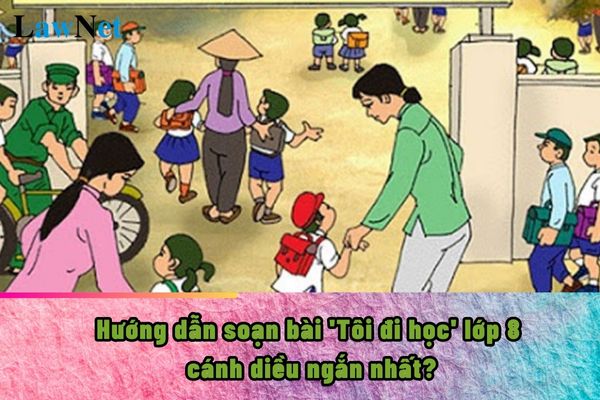Guidelines for preparing the lesson 'Toi di hoc' for Grade 8 students according to the 'Canh Dieu' curriculum in Vietnam
Guidelines for preparing the lesson "Tôi đi học" for Grade 8 students according to the 'Canh Dieu' curriculum in Vietnam
Guidelines for preparing the lesson "Tôi đi học" for Grade 8 students according to the 'Canh Dieu' curriculum in Vietnam are as follows:
|
Guidelines for preparing the lesson "Tôi đi học" for Grade 8 students according to the 'Canh Dieu' curriculum in Vietnam
– Thanh Tinh (1911 – 1988), born in Thua Thien – Hue. He is a representative writer of the 20th century Vietnamese literature. Thanh Tinh's works exude a gentle, pure, soothing affection. |
*Note: Information is for reference only./.

Guidelines for preparing the lesson "Tôi đi học" for Grade 8 students according to the 'Canh Dieu' curriculum in Vietnam (Image from the Internet)
Do grade 8 students in Vietnam learn about narrative essays?
According to Section IV of the Appendix on the Literature Program in General Education issued along with Circular 32/2018/TT-BGDDT, the grade 8 Literature program is built as follows:
[1] Regarding language skills
- General requirements:
+ Know how to apply Vietnamese knowledge along with personal experiences and reasoning abilities to understand the text; know how to read texts by type; understand the explicit and implicit content of the text.
+ Recognize and begin to analyze, evaluate the prominent content and form characteristics of the text;
+ Know how to compare this text with another text, relate to personal life experiences; from there, have personal views, thoughts, and feelings about life, enriching the spiritual life.
- Requirements for grade 8 and 9: write narrative, argumentative, and explanatory essays correctly, according to steps, and integrate expression methods.
- Write narrative texts focusing on creatively recounting read stories; what has been witnessed, participated in; imagined stories incorporating descriptive and expressive elements;
- Descriptive texts focus on describing activities; expressive texts concerning scenery, people, and expressing perceptions of literary works;
- Know how to compose poems to mainly recognize the characteristics of familiar forms of poetry;
- Write argumentative texts about issues reflecting personal thoughts and opinions, requiring relatively simple argumentation methods and easily found evidence;
- Write explanatory texts on issues close to students' life and understanding with common structures;
- Fill in several forms, compose some practical texts like work memos, emails, written reports, advertisements, and interviews.
- Write orderly, knowing how to find materials to meet writing requirements; understand intellectual property rights and know how to cite texts.
- Clearly present ideas and feelings; be confident when speaking in front of many people; use appropriate language, gestures, and body language when speaking;
- Retell coherently the read or heard story; share personal emotions, attitudes, experiences, ideas concerning discussed issues; discuss opinions on read or heard matters; explain an object or process;
- Know how to speak suitably for purposes, subjects, and communication contexts; know how to use images, symbols, diagrams, etc., to present issues effectively.
- Listen empathetically and summarize content; recognize and begin to evaluate the reasons and evidence used by the speaker;
- Recognize the speaker's emotions; know how to respond effectively to what was heard.
[2] Regarding literary competencies
- Recognize and distinguish between literary texts: stories, poems, plays, and some typical genres of each; analyze the effect of some form elements in each literary genre; understand both explicit and implicit content in literary texts.
- Present perceptions and thoughts on literary works and their impact on themselves; initially, create some literary products.
- For grade 8 and 9:
+ Understand the author's conveyed messages, thoughts, feelings, and attitudes in the text; recognize literary scripts, novels, and Nom verse tales, rules-based poems, and free verse, tragedy and comedy;
+ Content and form of literary works, literary themes; recognize and analyze the effects of some form elements and artistic devices in each literary genre (combining narrator's and character's words, viewpoint, conflict, poetic rules, layout, words, lyrical emotional flow;
+ Rhetorical devices like anaphora, wordplay, sarcasm, paradox). Recognize general characteristics of Vietnamese literary history; understand literature's impact on personal life.
Thus, as per the grade 8 literature program's requirements, students need to write narrative essays.
What are the common goals for teaching grade 8 Literature in Vietnam?
According to Section III of the Appendix on the Literature Program in General Education issued along with Circular 32/2018/TT-BGDDT, the grade 11 literature program is built as follows:
- Form and develop for students essential qualities: patriotism, kindness, diligence, honesty, and responsibility; nurture the soul, form character and develop individuality.
The Literature subject helps students explore themselves and the world around them, understand people, have a rich spiritual life, and have a humane perception of life and behavior; love the Vietnamese language and literature; have a sense of origin and national identity, contributing to preserving and developing Vietnamese cultural values; be willing to assimilate global cultural quintessence and integrate internationally.
- Contribute to helping students develop common competencies: self-control and self-learning, communication and cooperation, problem-solving and creativity.
>> Especially, the Literature subject helps students develop language and literary competencies: improves reading, writing, speaking, and listening skills; has foundational knowledge of Vietnamese and literary works, develops imaginative thinking and logical thinking, contributes to forming the basic education of a cultured person; knows how to create common texts; appreciates and evaluates literary texts in particular and communicative products and aesthetic values in general in life.

